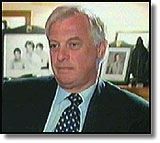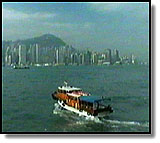
|
The Handover of Hong KongHong Kong was a British Dependent Territory until it was handed back to China at midnight on June 30 1997.
Hong Kong's Significance
History of Hong KongThe territory of Hong Kong once administered by Britain consists of three parts:
The Joint DeclarationThe Joint Declaration (officially the Sino-British Declaration on the Question of Hong Kong) declares that Hong Kong will be "restored" to the People's Republic of China with effect from July 1 1997 and that China will "resume the exercise of sovereignty" from that date. The Joint Declaration will apply for fifty years. Hong Kong will be known as the Hong Kong Special Administrative Region (SAR). Britain agreed to return Hong Kong to China in return for guarantees about how China would treat Hong Kong in the future:
The "Basic Law" for Hong Kong was adopted by China's National People's Congress on April 4, 1990. It implemented the provisions of the Joint Declaration and provides a constitutional basis for Hong Kong.
Relations Between China And BritainThe bloody crackdown on by Chinese troops on protests in the Chinese capital, Beijing, on June 4 1989, known as the "Tiananmen Square massacre" and shown on television around the world, soured relations between Britain and China.
The former British minister, Chris Patten, was appointed Governor of Hong Kong in 1992. In October 1992, the new Governor announced new democratic reforms for Hong Kong, which the Chinese Government opposed and which led to a crisis in Sino/British relations. In 1995 and 1996 relations between the British and Chinese Governments began to improve, and a series of ministerial visits and meetings between the two governments occurred.
Hong Kong's Future
In December 1996, the Chinese Government appointed Tung Chee-Hwa Chief Executive-designate of Hong Kong. He will take over from Chris Patten on July 1. In February 1997, China announced its decision to repeal or amend 26 of Hong Kong's laws, on the grounds that they contravened the Basic Law. The overturning of laws which cover the registration and funding of political parties and other groups, and spell out procedures for obtaining police permits to hold protest demonstrations, has caused particular concern. The British Foreign Office "Mission Statement" of May 12, brought in by the new Labour government, stated that a key priority was a "successful transition to Chinese rule in Hong Kong, which promotes the colony's prosperity and preserves its freedoms...The Government is fully committed to the well-being of Hong Kong, in particular the rule of law and the rights and freedoms enjoyed there now". |
Diana, Princess of Wales, 1961-1997
Conference 97
Devolution
The Archive
News |
Issues |
Background |
Parties |
Analysis |
TV/Radio/Web
Interactive |
Forum |
Live |
About This Site
News |
Issues |
Background |
Parties |
Analysis |
TV/Radio/Web
Interactive |
Forum |
Live |
About This Site
© BBC 1997 |
politics97@bbc.co.uk |



